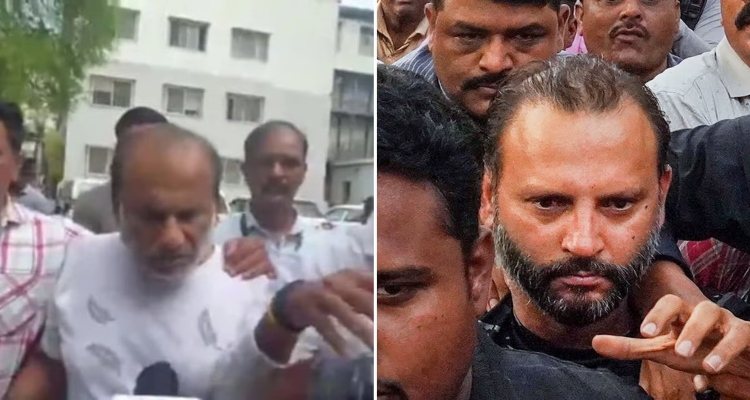
A Pune court has granted bail to the father and grandfather of the juvenile involved in the Porsche car crash. This decision pertains to a case concerning the alleged kidnapping and wrongful confinement of their family driver following the fatal accident in May.
A Judicial Magistrate (First Class) has granted bail to Vishal Agarwal, the father of the 17-year-old boy involved in the Porsche car crash and a prominent builder, as well as his grandfather. Both had been arrested at the end of May and were currently in judicial custody.
Teen’s Father Remains in Custody
However, Vishal Agarwal, who was arrested by the police from the adjoining Pimpri-Chinchwad township in a separate cheating case, will remain behind bars, the teen’s grandfather is expected to be released from jail.
According to the police, the father and grandfather of a teenager allegedly kidnapped their family driver after he left a police station on May 19 at 11 pm, hours after a crash. They purportedly wrongfully confined him at their bungalow and attempted to coerce him into admitting that he, not the juvenile, was driving when the accident occurred.
A Porsche driven by the 17-year-old boy, allegedly in a drunken state, fatally struck two motorbike-borne software engineers in Pune’s Kalyani Nagar area in the early hours of May 19.
Defense lawyer Prashant Patil informed the media that his clients were granted bail by the court in the alleged kidnapping and wrongful confinement case of the driver.
“My clients will cooperate with the investigative agency and shall abide by the stringent bail conditions imposed by the court,” Patil said.
In his argument on the bail plea of the father-son duo, Patil told the court that the driver, after leaving the Yerawada police station on May 19, chose to go to the servant’s quarters at the Agarwals’ bungalow of his own accord and stayed there until the next day, when his wife and son came to take him home.
Patil refuted the prosecution’s claim that the driver was kidnapped and confined in the house of the accused. He argued that when the accident occurred, the teen’s grandfather was in Delhi. “Since the registration of the offence against the juvenile, his grandfather was with the police, leaving no possibility for him to kidnap the driver,” Patil submitted.
Court Decisions and Public Outrage
Last month, a court granted bail to Agarwal, who was arrested on May 21, in a case related to the Juvenile Justice Act. The builder was booked under relevant sections of the Motor Vehicles Act (MVA) and the Juvenile Justice Act (JJA) for failing to fulfill his duties as a guardian.
On June 25, the Bombay High Court directed the release of the boy from an observation home, declaring the Juvenile Justice Board’s (JJB) detention order illegal. After the accident, the boy was detained but granted bail the same day by the JJB, which also required him to write a 300-word essay on road safety.
Due to public outrage over the swift and lenient bail terms, the police filed an application before the JJB seeking an amendment of the bail order. On May 22, the board ordered the boy to be taken into custody and sent to the observation home.
The minor boy’s mother, two doctors from the government-run Sassoon General Hospital, and three others are in judicial custody in a case related to swapping the juvenile’s blood samples to show he was not drunk at the time of the crash.
Meanwhile, further trouble arose for the teen’s builder-father as he was arrested by the Pimpri Chinchwad police in Pune district in a cheating case related to one of his real estate projects. Police took Agarwal’s custody from the Pune jail, where he was lodged, and produced him before a court, which remanded him in fresh police custody for two days, according to an official.
Cheating Case Against Agarwal’s Firm
Vishal Adsul, chairman of Nancy Brahma Residency, a project constructed by Agarwal’s firm in the Bavdhan area, had filed a complaint against him and four others earlier this year. A case was registered under Indian Penal Code sections 420 (cheating), 409 (criminal breach of trust), and provisions of the Maharashtra Ownership Flats Act. The construction firm allegedly failed to provide sufficient open space for the project, gave only one open space to three buildings by altering the plans, and did not obtain the housing society’s permission for constructing two 11-story buildings on its land, said a police official.




